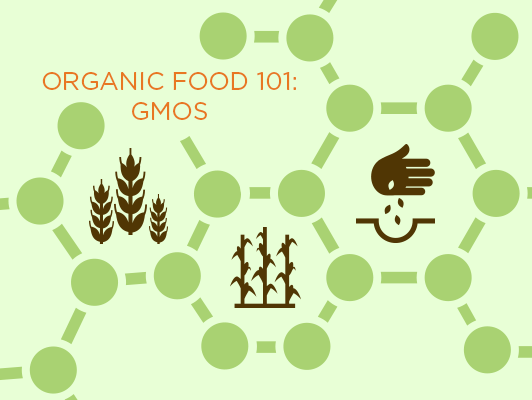What are GMOs (Genetically Modified Organisms)?
It’s almost impossible to have a conversation about organic foods and not discuss GMOs (genetically modified organisms). GMOs are in the headlines more and more these days, and it seems like everyone is talking about them. So here’s the low-down on GMOs!
What are GMOs?
A GMO is an organism that has been changed from the way it occurs naturally. The change involves adding a gene of an unrelated species, using technological processes. Plants are modified to make them:
- More resistant to insects
- More herbicide tolerant
- Yield more nutrition than they normally would.
This technology has been used in more than 40 species of plants used for food, textiles and landscaping. The most common GMO crops are soybeans, corn, cotton, and grapeseed oil. Currently, about 60 to70 percent of processed food sold in the grocery store contains genetically modified ingredients.
How are the products of genetic modification and conventional breeding different?
As long as humans have been taming plants and animals, we have bred them selectively. This process is different from today’s genetic modification. Selective breeding can only occur between two organisms that are so closely related, they can produce offspring. Genetic modification involves species that cannot reproduce with each other naturally. The entire process is bypassed in a lab. Here are two examples:
1. Selective breeding: A Labradoodle is the result of breeding a Labrador retriever with a poodle to achieve the new breed. Dogs can produce offspring across breeds without human intervention..
2. Genetic modification: A tobacco plant must be genetically modified to express the “glow gene” from a certain marine bacteria. Marine bacteria can never produce offspring with a tobacco plant in nature. (This really exists! Read about it here.)
Are GMOs safe?
Nothing, of course, is 100 percent safe. Also, what is safe for some may not be for others. The FDA, EPA, and the USDA are in charge of regulating GMOs. There are no foods that have undergone more research and testing than genetically modified foods. However, it is general practice for the research, testing, and cost to fall to the companies producing the crop. It makes sense to question the results, since they tend to benefit the industry doing the research. Still, most scientists agree we know enough about gene expression to say the current GMO crops on the market are safe for consumption.
Pros and cons of GMOs
Everything in life has pros and cons, and GMOs are no exception. Here are some potential cons of GMOs:
- Accidental contamination of non-GMO crops
- Possible antibiotic resistance
- Evolution of weeds and pests that are herbicide- and pesticide-resistant
But there are benefits, too:
- Increased food supply, particularly benefiting third-world countries with hunger problems
- Increased resistance to pests and diseases
- Crops that are more tolerant to drought
If you choose to avoid GMOs, the best option is to purchase organic foods and/or foods that have a low chance of being GMO. By definition, organic foods must not be or contain GMOs. But if you choose not to avoid GMOs, you can do so with the knowledge that they have been extensively studied. No differences have been found between them and conventional crops.
What do you think about GMOs? Do you think they are safe, or do you avoid them?




